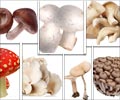Highlights
- Selected edible and medicinal mushrooms may effectively enhance neurite outgrowth in the brain by stimulating nerve growth factor (NGF) production.
- NGF is a stimulating //agent that helps in the regeneration of damaged neurons.
- Nearly 12 varieties of mushrooms have exhibited neuro-generative properties which helps treat dementia and Alzheimer's disease.
In "Edible and Medicinal Mushrooms: Emerging Brain Food for the Mitigation of Neurodegenerative Diseases," Chia Wei Phan, Pamela David, and Vikineswary Sabaratnam, University of Malaya, Kuala Lumpur, Malaysia, discuss the scientific findings related to the health benefits of edible and culinary mushrooms. The authors focus on the activity of bioactive components of mushrooms that may offer neuroprotective and cognitive benefits.
Mushroom As A Functional Food
Functional food is food that has a potentially positive effect on health beyond its basic nutrition. Examples of functional food are oatmeal, for its high soluble fiber that can help lower cholesterol levels, and orange juice fortified with calcium for bone health.
Mushrooms might have the potential to be functional foods with neuroprotective and cognitive benefits. It is well documented that the polysaccharides found in mushrooms are effective immunomodulating agents.
Mushrooms contain diverse yet exclusive bioactive compounds that are not found in plants. It is very likely that a dietary intake of mushroom or mushroom-based extracts might have beneficial effects on human health and improve brain function.
Selected mushrooms with potential to be explored as mitigators of neurodegeneration include Hericium erinaceus, Dictyophora indusiata, Grifola frondosa, Tremella fuciformis Berk, Tricholoma sp., Termitomyces albuminosus, Lignosus rhinocerotis, Cordyceps militaris, Pleurotus giganteus, Ganoderma lucidum P. Karst, and Ganoderma neo-japonicum Imazeki.
The extract of H. erinaceus was reported to exert neurotrophic action and improve myelination process in the rat brain without affecting nerve cell growth and toxicity.
D. indusiata is a famous edible mushroom used in Chinese cuisine and is considered the Queen of Mushrooms. Dictyophorines A and B, were isolated from the mushroom and were found to promote NGF synthesis in rat astroglial cells. According to the study done by Kawagishi et al., it was shown that the quantity of NGF secretion into the medium in the presence of 3.3 mM of dictyophorines A was four times higher than that of the control without treatment.
"In contrast to the body of literature on food ingredients that may benefit cardiometabolic diseases and cancer, very few studies have focused on food that may benefit neurodegenerative diseases," says Journal of Medicinal Food Editor-in-Chief Sampath Parthasarathy, MBA, PhD, Florida Hospital Chair in Cardiovascular Sciences and Interim Associate Dean, College of Medicine, University of Central Florida. "The current study might stimulate the identification of more food materials that are neuroprotective."
Reference
- Phan Chia-Wei et al., Edible and Medicinal Mushrooms: Emerging Brain Food for the Mitigation of Neurodegenerative Diseases, Journal of Medicinal Food (2017) doi:10.1089/jmf.2016.3740.
Source-Medindia











